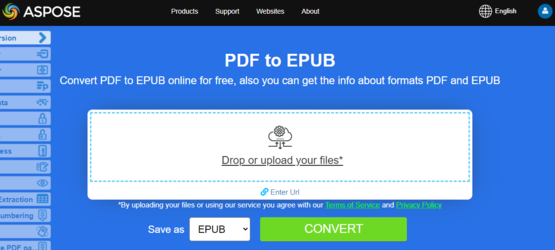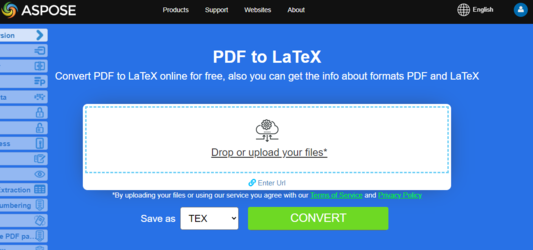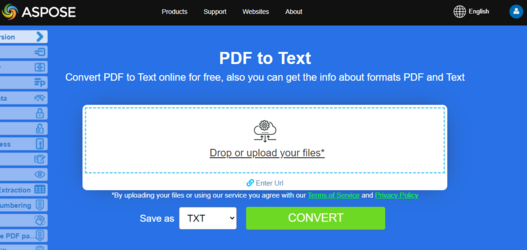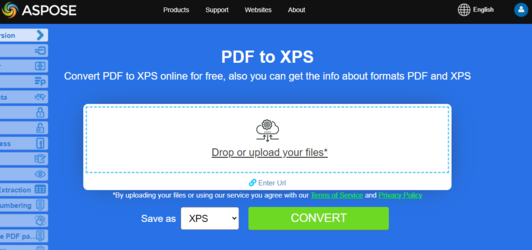Convert PDF to EPUB, TeX, Text, XPS in Go
Convert PDF to EPUB
EPUB is a free and open e-book standard from the International Digital Publishing Forum (IDPF). Files have the extension .epub. EPUB is designed for reflowable content, meaning that an EPUB reader can optimize text for a particular display device. EPUB also supports fixed-layout content. The format is intended as a single format that publishers and conversion houses can use in-house, as well as for distribution and sale. It supersedes the Open eBook standard.
The provided Go code snippet demonstrates how to convert a PDF document into a EPUB using the Aspose.PDF library:
- Open a PDF document.
- Convert a PDF file to EPUB using SaveEpub function.
- Close the PDF document and release any allocated resources.
package main
import "github.com/aspose-pdf/aspose-pdf-go-cpp"
import "log"
func main() {
// Open(filename string) opens a PDF-document with filename
pdf, err := asposepdf.Open("sample.pdf")
if err != nil {
log.Fatal(err)
}
// SaveEpub(filename string) saves previously opened PDF-document as Epub-document with filename
err = pdf.SaveEpub("sample.epub")
if err != nil {
log.Fatal(err)
}
// Close() releases allocated resources for PDF-document
defer pdf.Close()
}
Try to convert PDF to EPUB online
Aspose.PDF for Go presents you online free application “PDF to EPUB”, where you may try to investigate the functionality and quality it works.
Convert PDF to TeX
Aspose.PDF for Go support converting PDF to TeX. The LaTeX file format is a text file format with the special markup and used in TeX-based document preparation system for high-quality typesetting.
The provided Go code snippet demonstrates how to convert a PDF document into a TeX using the Aspose.PDF library:
- Open a PDF document.
- Convert a PDF file to TeX using SaveTeX function.
- Close the PDF document and release any allocated resources.
package main
import "github.com/aspose-pdf/aspose-pdf-go-cpp"
import "log"
func main() {
// Open(filename string) opens a PDF-document with filename
pdf, err := asposepdf.Open("sample.pdf")
if err != nil {
log.Fatal(err)
}
// SaveTeX(filename string) saves previously opened PDF-document as TeX-document with filename
err = pdf.SaveTeX("sample.tex")
if err != nil {
log.Fatal(err)
}
// Close() releases allocated resources for PDF-document
defer pdf.Close()
}
Try to convert PDF to LaTeX/TeX online
Aspose.PDF for Go presents you online free application “PDF to LaTeX”, where you may try to investigate the functionality and quality it works.
Convert PDF to TXT
The provided Go code snippet demonstrates how to convert a PDF document into a TXT using the Aspose.PDF library:
- Open a PDF document.
- Convert a PDF file to TXT using SaveTxt function.
- Close the PDF document and release any allocated resources.
package main
import "github.com/aspose-pdf/aspose-pdf-go-cpp"
import "log"
func main() {
// Open(filename string) opens a PDF-document with filename
pdf, err := asposepdf.Open("sample.pdf")
if err != nil {
log.Fatal(err)
}
// SaveTxt(filename string) saves previously opened PDF-document as Txt-document with filename
err = pdf.SaveTxt("sample.txt")
if err != nil {
log.Fatal(err)
}
// Close() releases allocated resources for PDF-document
defer pdf.Close()
}
Try to convert Convert PDF to Text online
Aspose.PDF for Go presents you online free application “PDF to Text”, where you may try to investigate the functionality and quality it works.
Convert PDF to XPS
The XPS file type is primarily associated with the XML Paper Specification by Microsoft Corporation. The XML Paper Specification (XPS), formerly codenamed Metro and subsuming the Next Generation Print Path (NGPP) marketing concept, is Microsoft’s initiative to integrate document creation and viewing into the Windows operating system.
Aspose.PDF for Go gives a possibility to convert PDF files to XPS format. Let try to use the presented code snippet for converting PDF files to XPS format with Go.
The provided Go code snippet demonstrates how to convert a PDF document into a XPS using the Aspose.PDF library:
- Open a PDF document.
- Convert a PDF file to XPS using SaveXps function.
- Close the PDF document and release any allocated resources.
package main
import "github.com/aspose-pdf/aspose-pdf-go-cpp"
import "log"
func main() {
// Open(filename string) opens a PDF-document with filename
pdf, err := asposepdf.Open("sample.pdf")
if err != nil {
log.Fatal(err)
}
// SaveXps(filename string) saves previously opened PDF-document as Xps-document with filename
err = pdf.SaveXps("sample.xps")
if err != nil {
log.Fatal(err)
}
// Close() releases allocated resources for PDF-document
defer pdf.Close()
}
Try to convert PDF to XPS online
Aspose.PDF for Go presents you online free application “PDF to XPS”, where you may try to investigate the functionality and quality it works.
Convert PDF to Grayscale PDF
The provided Go code snippet demonstrates how to convert the first page of a PDF document into a Grayscale PDF using the Aspose.PDF library:
- Open a PDF document.
- Convert a PDF Page to Grayscale PDF using PageGrayscale function.
- Close the PDF document and release any allocated resources.
This example converts a specific page of your PDF to Grayscale:
package main
import "github.com/aspose-pdf/aspose-pdf-go-cpp"
import "log"
func main() {
// Open(filename string) opens a PDF-document with filename
pdf, err := asposepdf.Open("sample.pdf")
if err != nil {
log.Fatal(err)
}
// PageGrayscale(num int32) converts page to black and white
err = pdf.PageGrayscale(1)
if err != nil {
log.Fatal(err)
}
// SaveAs(filename string) saves previously opened PDF-document with new filename
err = pdf.SaveAs("sample_page1_Grayscale.pdf")
if err != nil {
log.Fatal(err)
}
// Close() releases allocated resources for PDF-document
defer pdf.Close()
}
This example will convert the entire PDF document to Grayscale:
package main
import "github.com/aspose-pdf/aspose-pdf-go-cpp"
import "log"
func main() {
// Open(filename string) opens a PDF-document with filename
pdf, err := asposepdf.Open("sample.pdf")
if err != nil {
log.Fatal(err)
}
// Grayscale() converts PDF-document to black and white
err = pdf.Grayscale()
if err != nil {
log.Fatal(err)
}
// SaveAs(filename string) saves previously opened PDF-document with new filename
err = pdf.SaveAs("sample_Grayscale.pdf")
if err != nil {
log.Fatal(err)
}
// Close() releases allocated resources for PDF-document
defer pdf.Close()
}



